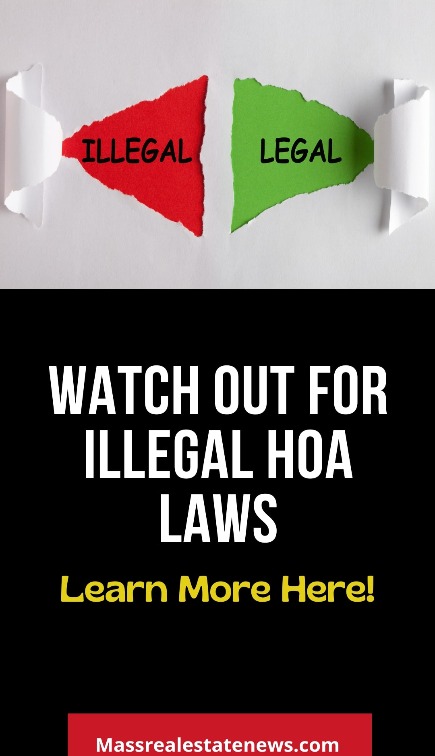HOA rules that break the law in Massachusetts can pose significant legal issues and implications. Understanding the role and importance of HOA rules in preserving property values is essential. Massachusetts has specific laws governing HOAs, including the Condominium and Fair Housing Act.
Identifying unenforceable rules for HOAs, such as those conflicting with federal or state laws, discriminatory or inconsistent, or lacking proper implementation procedures, is crucial. We will explore various examples of HOA rules in Massachusetts that violate the law. We will also discuss homeowners’ rights and recourse when faced with unenforceable regulations, including dispute resolution and legal actions.
Staying informed about changing HOA rules and laws is vital for homeowners.
Overview of HOA Rules in Massachusetts
In the context of Massachusetts, understanding the role of Homeowners’ Associations (HOAs) is essential for homeowners. HOAs play a vital role in preserving property values and regulating the behavior of residents within a community. HOAs aim to maintain a harmonious living environment and protect property investments by setting and enforcing rules.
Homeowners need to understand HOA rules and common violations.
Understanding the Role of HOAs
HOAs act as governing bodies and are responsible for establishing and enforcing rules that all homeowners within a community must follow. These rules typically cover diverse aspects, including property maintenance, architectural guidelines, noise regulations, and pet restrictions. The primary objective of HOAs is to ensure the community’s overall well-being and enhance property values.
Importance of HOA Rules in Preserving Property Values
Establishing clear and enforceable rules is crucial for safeguarding property values within an HOA-governed community. These rules help maintain a certain level of aesthetic appeal, quality, and uniformity throughout the neighborhood. HOA rules promote a desirable living environment for all residents by preventing activities that could negatively impact property values.
Overview of Massachusetts Laws Governing HOAs
Massachusetts has specific laws and regulations that govern HOAs and their operations. The state’s Condominium Act provides a framework for establishing and managing condominium associations, a common form of HOAs. It outlines various legal requirements regarding association bylaws, budgeting, voting procedures, and dispute resolution.
Furthermore, Massachusetts Fair Housing laws protect homeowners from discriminatory practices, ensuring equal treatment for all residents. This law prohibits any HOA rules or policies that discriminate based on race, color, religion, sex, familial status, national origin, disability, or other protected categories.
Homeowners need to be aware of these laws and their rights within the framework of HOA regulations in Massachusetts. By understanding the legal foundation, homeowners can navigate potential conflicts and protect their interests within their HOA-governed communities.
Identifying Unenforceable HOA Rules in Massachusetts
When it comes to homeowners’ association (HOA) rules in Massachusetts, it is essential to identify any unenforceable rules. These rules may conflict with federal or state laws, be discriminatory or inconsistently applied, or lack proper implementation procedures. Here are some key aspects to consider:
HOA Rules Conflicting with Federal and State Laws
HOA rules in Massachusetts must comply with federal and state laws. Practices that directly contradict or violate these laws are unenforceable. Homeowners should review the applicable laws, such as the Condominium Act and Fair Housing Act, to ensure compliance and identify any conflicting HOA rules.
Discriminatory or Inconsistent Application of HOA Rules
HOA rules should be applied consistently and without discrimination. Rules that disproportionately affect specific individuals or groups based on characteristics protected by law are considered discriminatory.
Homeowners should scrutinize the application of HOA rules to ensure fairness and identify any instances of discrimination or inconsistent enforcement.
Lack of Proper Implementation Procedures for HOA Rules
Proper implementation procedures are crucial for HOA rules to be enforceable. Those rules may be unenforceable if an HOA fails to follow the correct procedures when implementing practices, such as obtaining necessary approvals or providing proper notice. Homeowners should review the HOA’s governing documents to understand the required processes and identify any lapses in implementation.
By carefully examining HOA rules in Massachusetts, homeowners can identify any that are unenforceable due to conflicts with federal or state laws, discriminatory or inconsistent application, or lack of proper implementation procedures. Understanding these issues empowers homeowners to protect their rights within the HOA community.
Specific Examples of HOA Rules That Break the Law in Massachusetts
When examining the HOA rules in Massachusetts, it becomes evident that specific rules violate the law and infringes upon homeowners’ rights. Here are some specific examples:
Violation of Fair Housing Act: Discriminatory Rules
One common issue arises when HOA rules discriminate against specific individuals or groups based on their protected characteristics, such as race, religion, gender, or disability. As mentioned, These rules violate the Fair Housing Act, which prohibits discrimination in housing.
For instance, if an HOA enforces regulations that restrict the use of common areas or facilities based on someone’s disability, it would violate federal law.
Restrictive Rules on Satellite Dishes: OTARD Rule
The Over-the-Air Reception Devices (OTARD) Rule, established by the Federal Communications Commission (FCC), grants residents the right to install satellite dishes on their properties. However, some HOAs may impose overly restrictive rules regarding satellite dish installations, violating the OTARD Rule. Homeowners can challenge such regulations if they prevent them from receiving satellite signals for TV, internet, or other communication services.
Challenging Size and Location Restrictions on Flags and Signs
Another typical example of HOA rules that break the law involves restrictions on the size and location of flags and signs. Homeowners in Massachusetts have the right to display the American flag and other non-commercial signs on their properties, as protected by state and federal laws. It would violate their rights if an HOA enforces rules restricting or prohibiting homeowners from displaying these items.
Homeowners must be aware of these specific examples of HOA rules that break the law in Massachusetts. Understanding their rights and the relevant regulations can empower homeowners to challenge such rules and defend their rights.
Homeowners’ Rights and Recourse Regarding Unenforceable HOA Rules
Understanding Homeowners’ Obligations vs. Unenforceable Rules
Homeowners within an HOA have certain rights and obligations. It is essential to distinguish between rules that homeowners must comply with and unenforceable rules. Unenforceable rules conflict with federal or state laws, are discriminatory, or are implemented without proper procedures. Homeowners have the right to challenge and seek recourse for these unenforceable rules.
Resolving Disputes with HOA Boards and Management
If homeowners believe that their HOA has implemented illegal or unenforceable rules, they should first attempt to resolve the dispute with the HOA board or management. This can be achieved through open communication, providing evidence of the rule’s illegality, and proposing alternative solutions. Mediation or alternative dispute resolution processes can also be explored to resolve amicably.
Legal Actions and Remedies for Violations of Homeowners’ Rights
If the dispute cannot be resolved through informal negotiations or mediation, homeowners may need to consider taking legal action to protect their rights. This may involve hiring a real estate attorney experienced in HOA law to assess the case and guide homeowners through the legal process.
Legal remedies may include filing a lawsuit to challenge the unenforceable rule, seeking injunctive relief to halt its enforcement, or pursuing monetary damages for violating homeowners’ rights.
In any legal actions, homeowners should be prepared to present evidence demonstrating the unlawfulness of the rule, the harm it has caused, and any applicable legal precedents. Complying with filing deadlines and court procedures when pursuing legal remedies is crucial.
By understanding their obligations, communicating with the HOA board, and asserting their rights when faced with unenforceable HOA rules, homeowners in Massachusetts can seek recourse and protect their property rights.
Staying Informed: Keeping Up with Changing HOA Rules and Laws in Massachusetts
Staying informed about the ever-changing landscape of HOA rules and laws in Massachusetts is essential for homeowners. By understanding and staying up-to-date with these regulations, residents can ensure they comply and protect their rights as members of their community associations.
Regularly reviewing and updating HOA rules, engaging in decision-making, and seeking legal counsel for clarification and guidance on HOA matters is essential.
Importance of Regularly Reviewing and Updating HOA Rules
Regularly reviewing and updating HOA rules is crucial for homeowners and their community associations. As laws change and new precedents are set, HOAs must adapt its regulations to remain legally compliant and address the evolving needs of their communities.
Residents should actively participate in the review process, providing input and suggestions for updates or revisions to ensure the rules align with their expectations and local legal requirements.
Engaging in Community Association Activities and Decision-Making
Becoming actively involved in community association activities and decision-making is an effective way for homeowners to stay informed about HOA rules and regulations. By attending community meetings, serving on committees, and volunteering for leadership positions, residents can gain firsthand knowledge of any proposed changes or updates to the rules.
Engaging in these activities also gives homeowners a say in shaping the rules and ensures their voices are heard when important decisions are made.
Seeking Legal Counsel for Clarification and Guidance on HOA Matters
In complex situations where homeowners require a deeper understanding of HOA rules and laws, seeking legal counsel can provide valuable guidance and clarification. Attorneys specializing in HOA matters can help homeowners interpret regulations, assess the enforceability of specific provisions, and navigate any legal challenges.
Consulting with legal professionals ensures homeowners thoroughly understand their rights and obligations, empowering them to make informed decisions about their involvement in the community association.
Final Thoughts
If you think your association is creating illegal or unenforceable rules, it will be wise to address them swiftly. Speak to other homeowners that share your concern and develop a plan of action to resolve the situation.










No Comment